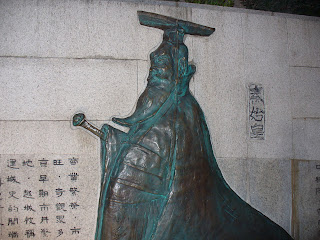
We were eating breakfast at the NCUT canteen. We had obtained our vegetable filled buns at the hot food counter and were looking around for something to drink. It was a hot day. The drink locker was open, but the attendant was gone. Fine, I thought. We can pay him when he comes back. I took out two juices. A canteen worker appeared, looking decidedly unfriendly. I did not understand her words, but it was clear she thought I was stealing juice. I held out my wallet. But no, because the juice attendant was not around, it appeared we could not have juice, though it was clearly available.
Now, I accept cultural differences. But this seemed like nonsense, not culture. The juice was there, the locker was open, we had money, and the day was hot. I said so--in English of course, the language I speak best. Naturally, the attendant did not understand me. A university student came along, explaining mildly this was how things were done. "When in Rome, you should do as the Romans do." True enough. But might we buy something to drink? She suggested a supermarket not far away. She was walking that way. Fair enough. I went with her, leaving Joe at the canteen. When we arrived, it was closed. The girl said "sorry" and disappeared.
So I went back to the canteen and sought out the attendant. I took some money from my wallet, and gesticulated toward the juice case. I presume I was difficult to ignore, for my voice was well above Chinese conversational tone. Some English speaking students came along. I explained I had not been allowed to buy orange juice, though it was clearly available, that I'd been taken to the supermarket by a student, and it was closed. "Wait here!" said one.
In China, rules are fluid, and everything is subject to negotiation. This kid went to the HOT FOOD counter, and said something there. Then, she asked me to present the orange juice at the HOT FOOD counter, and that was where I paid. The incident incurred a lot of unnecessary commotion, but everyone was satisfied, except perhaps for the first attendant, who had said we could not buy juice.
Back home, it would have been different; we would have simply walked out of the place. Joe would have been embarrassed if I had made a fuss. But there was nowhere else around to get breakfast, and this is China. Sometimes, it makes sense not to accept the first answer.




















































